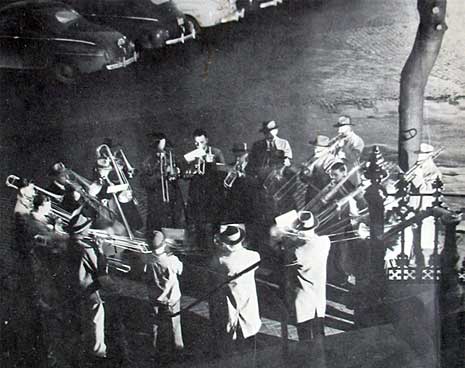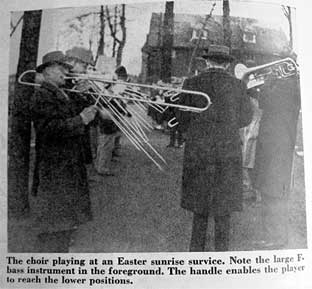Not so long ago — well, maybe it was pretty long ago, I did a little write-up on Yamaha Slide Oil. Give it a look, I’ll wait. Why do I bring it up? Well, there’s a good article about this Yamaha mixture at The Reforming Trombonist that is well worth reading, both because of the Yamaha stuff and a certain other lubricant.
Tag Archives: trombone
Happy 2014
Happy New Year to all those who came by this website in 2013, and even those who didn’t. Sorry Commander Trombone wasn’t updated more often. I’ll endeavor to do something about that this year. Maybe a nine part series on trombone slide lubrication? Or slide maintenance? It’s a simple process, really, but you’re going to need a belt sander and your own lathe . . .
Etude Magazine, April 1955: Two Centuries of Trombones

No posts since December? Er, Happy New Year? To get things rolling again, a trombone article from the April, 1955 issue of ETUDE magazine is discussed below. The history of The ETUDE magazine is recounted here. This particular issue featured the ad pictured in the inset on the back. Click for a larger version.
The April, 1955 issue of ETUDE music magazine featured the article, “Two Centuries of Trombones.” The title was a little deceptive: instead of covering everything about trombones over the course of two centuries, the piece focussed on how trombone playing was historically significant to the town of Bethlehem, PA. Specifically, the town trombone choir’s performances were used to mark events that were solemn, lighthearted, or . . . anything. Below are excerpts from this article that frustrated readers of this website — yearning for new content — may find edifying:

“Why trombones? It has been suggested that the somber tones of these slide instruments were in keeping with the idea of playing chorales to announce a death as well as providing music at a funeral. Add to that an all-weather instrument for outdoor playing (although the slides of the trombone will freeze in very severe winter cold), and you have a practical as well as an aesthetic reason for the use of the trombones.”
Remember, though, these trombonists were not buskers. In fact, in stark contrast to buskers, the trombonists could be mobilized immediately as defenders of the town, particularly around Christmastime.

Bethlehem trombonists focus sound energy safely inward
“A legend has grown up around the Christmas tromboning of that year [1755]. The story has long been accepted by many people that late Christmas Eve a war party of Indians camped across team Monacacy Creek, planning to attack the settlement as the sun rose. However, the trombonists from their rooftop position greeted the day before the Indians. The redmen, hearing sounds they could not understand, thought that it was the voice of the Great Spirit telling them to leave Bethlehem in peace.”
It’s likely that some sort of qualifier was needed there, like “may have thought it was the voice of the Great Spirit.” Or, a complete revision: “The native americans, hearing sounds they quickly identified as trombones, felt a little sorry for the pale-skins and decided that any sort of attack was simply not worth it.” Anyway, back to Christmas:
“Of course, at Christmas the trombone is not neglected. The Christmas eve love feast is opened with the playing of Hail Thou Wondrous Infant Stranger, and later the vigil services begin with the notes of Hark a Voice from Yonder Manger. These are old chorales. Either one or both may have been used in 1755. At that time it was the custom for the trombonists to announce Christmas day at dawn.”

The majestic sounds of the trombone are both festive and appropriate for Christmastime, and likely met with the approval of the townsfolk (provided the intonation was halfway decent). The possible downside? It seems the musical encouragement meant the trombonists were always up and playing at the crack of dawn regardless of the time of year or holiday. Easter is next, and naturally that involves waking everybody up, too. But how? With a large F-Bass trombone with a handle that allows the player to reach the longer slide positions.
“Long before the congregation assembles in the church, from whence they proceed to the cemetery, trombonists pass through the community awakening the sleepers with the chorales announcing that The Lord has risen.”
By the time 4th of July rolled around, the town had the good sense to put the kibosh on the “up-early and always playing the trombone” thing:
“In the past it was even customary to herald the Fourth of July at daybreak, but this custom has been given up, either because folk living near the church liked to sleep on a holiday morning and objected to being disturbed at sunrise, or the trombonists themselves preferred Morpheus to Polyhymnia.”
Importantly, there can be no ETUDE trombone article without a funny little anecdote that involves the total disruption of a beleaguered trombonist’s embouchure. Here goes nothing:
“Stories are still told of how one player’s false teeth fell from the steeple to be shattered on the roof of Simon Rau’s drug store far below, but there is no record of a trombone ever having fallen to the same doom, although from time to time someone’s hat becomes a casualty.”
To conclude this ETUDE article, there’s a quote from Rufus A. Greider, who, 80 years previous to 1955, had written about the unwavering dedication of the Bethlehem trombonists.
“It requires not a little self-denial to serve as a performer of the trombone choir. He is required to attend all services when they are used. He is obliged to assist in announcing every death which occurs in the congregation, to play at the funerals, to play on every festival, morning and afternoon, to perform before the celebration of the Lord’s supper. He is duty-bound to go to the graveyard or climb in the church belfry at all seasons and in every kind of weather; cold or rain must not be heeded, he goes through it all.”
In other words, these guys should have unionized.
Next:
“THE END”
That’s one way you know an ETUDE article is over. There’s a big “THE END” at the article’s conclusion.
THE END
Jack Teagarden Tours the Near East in 1958
In October of 1958, Jack Teagarden and his working band undertook a tour of the near east for the U.S. State Department. The trip covered eighteen countries and 17,000 miles, winding up in January of 1959. The King of Thailand, himself a saxophonist and composer, was happy to see Teagarden, someone whose music he had only enjoyed on recordings up until that time. Naturally, the King decreed a jam session at his palace — it went on for 6 hours by Teagarden’s own account. “You tell your friend Eisenhower that you’re the finest thing he’s ever sent us,” the King said.
Of one concert stop, Teagarden later remembered:
“We played a kind of fair in Laos before about two thousand people, and they just stood there for two hours, with their arms folded, the women with babies on their backs. They didn’t clap, they didn’t say anything. But they didn’t move, either. They stayed until the last note.”
It was a taxing tour for the musicians involved. Because of the ambassadorial mission, the band had to be available for unscheduled concerts and performances, which added to the expected fatigue. In Afghanistan, there was a scarcity of pianos. Most of the band’s members got the flu. Jack’s bassist, Stan Puls, got appendicitis and had to be taken off the itinerary. He was replaced by Lee Ivory, a very capable bassist as well as an active duty serviceman (and apparently a reporter for Stars and Stripes).
In the amazing kinescope shown here, we pick up the band near the end of its tour in Japan. Teagarden looks gaunt — he had contracted uremia during this leg — but is otherwise in good musical form, as he always seemed to be. This TV-film is incomplete — some of the reels were apparently loaned out and never returned. A Japanese band plays and grapples (well) with the style that Teagarden and company tossed off without seeming to try. Jack performs with a studio orchestra next; included are Stars Fell on Alabama, Diane, Peg O’ My Heart, and Indiana. This studio orchestra format was becoming more common in Jack’s later recordings for Capitol Records. The working band returns for When the Saints Go Marching In.
Jack Teagarden’s working band, shown in the film:
- Max Kaminsky, trumpet
- Jerry Fuller, clarinet
- Don Ewell, piano
- Lee Ivory, bass
- Ronnie Greb, drums
In July of 1959, Jack recorded the King of Thailand’s tune, When for Roulette Records.
Teagarden later said of the trip’s mission, “All the music I’ve played has finally paid off. I feel that I did some good for America.”
Roswell Rudd Records An Album Of Standards by Roswell Rudd — Kickstarter

The trombonist Roswell Rudd is up to a new project: recording an album of standards. Help Mr. Rudd out by visiting the link below and adding your bit of support.
Roswell Rudd Records An Album Of Standards by Roswell Rudd — Kickstarter.
